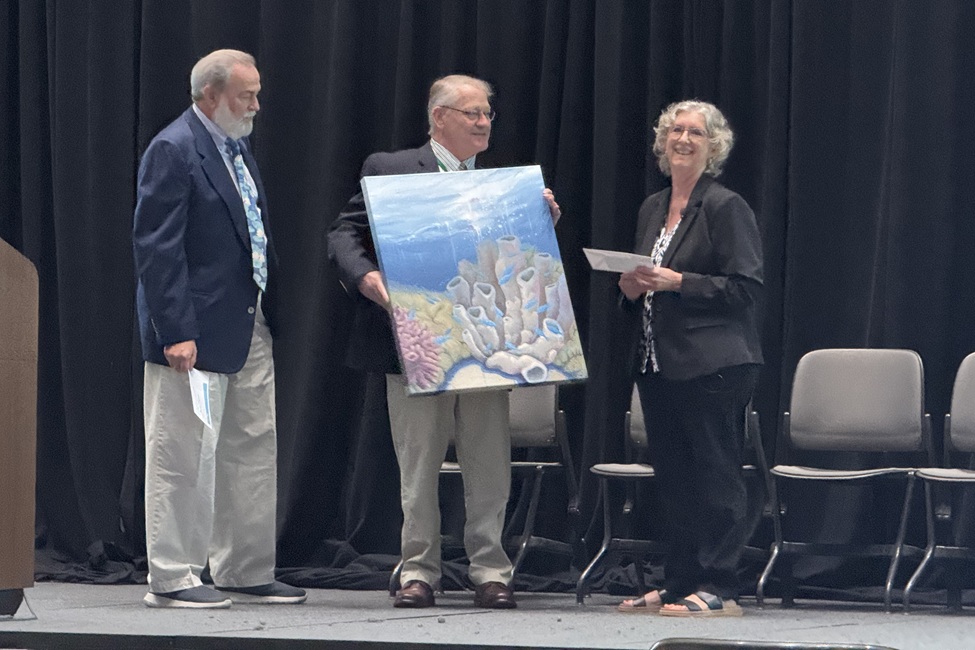FAU's Amy Wright, Ph.D., Honored for Marine Drug Discovery Research

Amy Wright, Ph.D., receives a large painting depicting her field of work as part of the Norman R. Farnsworth ASP Research Achievement Award. (Courtesy: American Society of Pharmacognosy)
Amy E. Wright, Ph.D., a research professor at Florida Atlantic University’s Harbor Branch Oceanographic Institute, has received the prestigious Norman R. Farnsworth ASP Research Achievement Award, the highest accolade presented by the American Society of Pharmacognosy (ASP). This award recognizes Wright’s sustained and exceptional contributions to the discovery and development of biologically active marine natural products with significant pharmaceutical potential.
Founded in 1959, the ASP is a scientific organization focused on studying natural products from plants, microbes and marine life that can be used as medicines. It promotes research and collaboration to help discover new drugs from these natural sources.
For more than 40 years, Wright has been at the forefront of natural products chemistry, focusing on the exploration of deep-water marine ecosystems to uncover novel compounds capable of addressing cancer, infectious diseases and other critical health challenges. Her groundbreaking research has profoundly impacted the field, bridging marine science and biomedical innovation with the promise of new therapeutic agents.
“Dr. Wright’s pioneering work in marine natural products chemistry has transformed the way we approach drug discovery from the ocean. Her extraordinary achievements continue to inspire the scientific community, demonstrating how dedication, innovation and collaboration can unlock the therapeutic treasures hidden within our planet’s oceans,” said James M. Sullivan, Ph.D., executive director of FAU Harbor Branch. “This award is a fitting tribute to her remarkable career, and we are proud to have her as a cornerstone of our team.”
Wright’s scientific journey began with a strong foundation in chemistry – earning her B.S. degree from California State University at Dominguez Hills and both her M.S. degree and Ph.D. in organic chemistry from the University of California at Riverside.
Since then, she has established herself as a leading figure in marine natural products research, with a distinguished record of scientific achievement and leadership. She is the author of more than 100 peer-reviewed publications and six book chapters, contributing significantly to the fields of marine drug discovery and ocean exploration. As an inventor on 33 United States patents, she has helped define new therapeutic applications for compounds derived from marine organisms.
Wright’s research has been supported by more than $25 million in externally awarded grants, which she has successfully managed to advance both basic and applied science. In recognition of her contributions, she was elected a Fellow of the National Academy of Inventors in 2017 and the ASP in 2018, and in 2022, she was elected president of the ASP. She received the prestigious Paul J. Scheuer Award in Marine Natural Products in 2024.
Among Wright’s most notable scientific accomplishments is her co-authorship on the seminal paper describing the structures of ecteinascidins 729 and 743 – discoveries that enabled the clinical development of one of the first marine-derived anticancer drugs. This discovery ultimately led to the development of Trabectedin (Yondelis™), an FDA-approved drug used in more than 40 countries for treating recurring soft tissue sarcoma and ovarian cancer.
Building on this success, Wright’s laboratory has discovered and characterized more than 100 marine natural products with potent biological activities. Her team has identified compounds exhibiting a wide range of effects, from anti-mitotic and anti-inflammatory to antibiotic and antiparasitic properties.
Some of the notable discoveries include leiodermatolide, a powerful anti-mitotic agent; neopeltolide, which targets mitochondria; dictyostatin, a mitotic spindle poison; and aphrocallistin, which selectively targets cancer cells with specific genetic mutations. In addition to isolating new compounds, Wright’s research has also delved into understanding their mechanisms of action. For instance, her work revealed that dictyostatin functions by stabilizing microtubules, a finding that has inspired ongoing research into its potential for treating Alzheimer’s disease.
Since 1984, the marine biomedical team at FAU Harbor Branch has conducted 107 expeditions and explored more than 3,400 sites. More than 1,000 dives used the Johnson-Sea-Link manned submersibles and remotely operated vehicles to collect marine samples from deep and mesophotic water habitats. These efforts have yielded a collection of more than 32,000 marine macro-organisms – including algae and invertebrates – many of which are new to science and serve as a rich resource for ongoing research.
“I’m truly honored and humbled to receive this recognition from the American Society of Pharmacognosy,” said Wright. “This award represents a significant milestone in my career and reflects the collective efforts of the many talented colleagues and collaborators I’ve had the privilege to work with over the years. It’s incredibly rewarding to see the impact of marine natural products research recognized in this way.”
Supported by funding from NOAA, NSF and the Harbor Branch Oceanographic Institute Foundation, Wright’s program continues to expand the frontiers of marine exploration. An innovative online portal now provides public access to images, videos and detailed information on these samples, showcasing four decades of marine research.
“The oceans have long been a remarkable source of natural products, many with significant pharmaceutical potential,” said Wright. “Our ongoing exploration of deep-water habitats has revealed an incredible diversity of compounds – both novel and familiar – with new activities that hold great promise for future drug development. The possibilities are vast, limited only by our imagination and determination to explore the unknown.”
-FAU-






